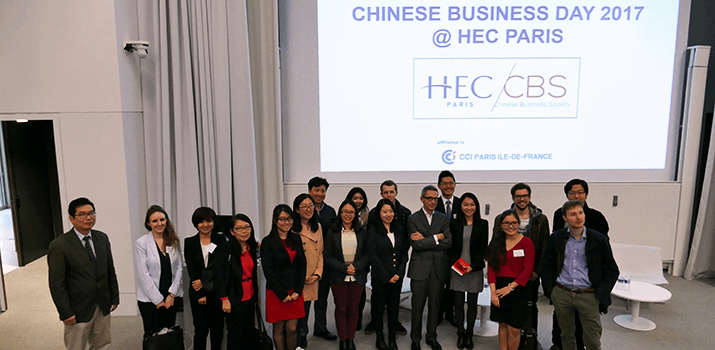David baverez at the Chinese Business Day
David Baverez (H88) a Hong Kong based investor, essayist and columnist took part in the Chinese Business Day

David Baverez, business angel and a keen observer of Chinese economic development gave a conference at HEC Paris, to mark the second edition of the Chinese Business Day.
The event was organised by the student run Chinese Business Society, with support from the careers and corporate partnerships services. It gave students the opportunity to encounter Chinese businesses and China based international businesses. Thanks to a number of presentations and workshops, the students were able to learn about the challenges faced by businesses operating in the country in a pragmatic manner.
To sum up the day, David Baverez’s speech shed light on the current state of Chinese economic development. Primarily highlighting the tremendous opportunity the Chinese market offers European businesses.
Interview.
What is your take on the event that you’ve just taken part in?
I think it’s fantastic that HEC has used its links with China to organise a Chinese Business Day. I was very proud to be able to contribute today having found out about the event through the HEC foundation, who asked me to speak.
It is important to highlight our aim; associating Europe with China to conquer the second wave of the digital revolution, a BtoB revolution of the Internet of things (IoT).
Why did you move to China?
I previously worked in finance and I was affected by the financial crisis in 2008; totally unprecedented, with its only point of comparison being the crisis of 1929. I therefore became aware that the world was in the process of change. The only way, in my eyes, to really understand what was happening was to travel. I decided to stop working and went travelling for a year: firstly to the United States, then Europe, finishing up in Hong Kong. It was in Hong Kong that I was really struck by its historical development. Very few western societies are familiar with China and this ignorance led me to analyse how things (happened?) there, so I would then be able to share it with the West. For this reason I was motivated to write a book « Paris Pékin Express » which has just started appearing in bookshops.
You are both a keen observer of Chinese society and its consumption patterns and also a private investor in local start-ups. How do you juggle the two?
My job is divided in two. On one hand, I read a vast amount of publications on the country, meet with local business men and try to use my analytical skills as an investor in relation to what I’m reporting. I adopt a « top down » perspective of China with a macroeconomic approach, followed by a « bottom up » vision or micro: I throw myself into the reality of the field, by financing start-ups and fighting to develop their business activity. I try to bring the two steps together, a rarity today.
In what fields do Chinese start-ups have a head start over the rest of the world?
From a general point of view, the digital is two times more developed in China than in the West. It represents 10% of GNP in comparison to a mere 5% in the Western World. The country is currently experiencing what I call in my book « the biggest step forward - season 4.0 »; with development at a rate two times faster than the West. At sectoral level, China is the world leader in e-commerce and also in financial technology companies. According to a report published by KPMG, the leading four companies in Fintech are Chinese and their growth shows no signs of slowing. As of 2020, China will become the global leader of the Internet of Things and more prominently in the market of connected cars. The country has an absolutely fascinating roadmap for the next 15 years.
Why would you advise entrepreneurs to emigrate to Asia and more specifically China to develop their start-up?
Primarily due to the market, China represents: 130 million people (10% of the population) are wealthy. This part of the population is a growing force and the challenge for foreign entrepreneurs is finding a high value service that China is in need of. The greatest problem in China is its productivity, which is not growing at a sufficient rate, meaning salaries are consequently not increasing as much as before. The European expertise that China is in need of is its productivity. If you succeed in automating a service using digital technology whilst adding a human touch, you’ll stand out against the competition.
Asides from being a major donor to the HEC Foundation, how would you perceive your engagement with the school?
My attachment to the school is first of all personal, I have met some extraordinary people at HEC who have become my best friends. At the moment I want my donations to be put towards the digital development of the school. As in many sectors, business schools will be shaken by the digital revolution and I see that HEC is doing what it takes to become a leader in digital learning.